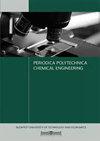CFD-based Estimation of Friction Factor in Rough Pipes with Herschel-Bulkley Fluids
IF 1.8
4区 工程技术
Q3 ENGINEERING, CHEMICAL
引用次数: 0
Abstract
The appropriate estimation of frictional losses in a pipeline system is essential. So far, little attention has been paid to determining the friction factors with non-Newtonian fluids, especially in rough pipes. This study aims at calculating the friction factor using validated three-dimensional Computational Fluid Dynamics models in Ansys CFX. Steady-state computations are performed with three different incompressible Herschel-Bulkley fluids in rough pipes with relative roughness of the inner pipe surface ε = 0.0005 – 0.01. A power-law type bath gel as a test fluid is used for experiments to validate our numerical model. The numerical results are compared with the measured values and also with numerous existing friction factor estimation models with the help of generalization of the Reynolds number in the relevant engineering range of Regen = 100 – 40,000. This paper shows that the existing approximations can not accurately describe the friction factor with pseudoplastic fluids in rough pipes. On the contrary, in the case of Bingham plastic fluid, a new, explicit calculation relation is found in a unified form accepted by the literature.基于cfd的Herschel-Bulkley流体粗糙管道摩擦系数估算
对管道系统的摩擦损失进行适当的估计是至关重要的。迄今为止,对非牛顿流体,特别是粗糙管道中摩擦系数的测定还很少关注。本研究旨在利用Ansys CFX中经过验证的三维计算流体动力学模型计算摩擦系数。在管内表面相对粗糙度ε = 0.0005 ~ 0.01的粗糙管道中,用三种不同的不可压缩Herschel-Bulkley流体进行稳态计算。采用幂律型浴液作为试验流体,对数值模型进行了实验验证。将雷诺数推广到Regen = 100 ~ 40000的相关工程范围内,将数值计算结果与实测值进行了比较,并与众多现有的摩擦因数估算模型进行了比较。本文表明,现有的近似方法不能准确地描述粗糙管道中含假塑性流体的摩擦系数。相反,在Bingham塑性流体的情况下,发现了一种新的、显式的计算关系,其形式是文献所接受的统一形式。
本文章由计算机程序翻译,如有差异,请以英文原文为准。
求助全文
约1分钟内获得全文
求助全文
来源期刊

Periodica Polytechnica Chemical Engineering
ENGINEERING, CHEMICAL-
CiteScore
3.10
自引率
7.70%
发文量
44
审稿时长
>12 weeks
期刊介绍:
The main scope of the journal is to publish original research articles in the wide field of chemical engineering including environmental and bioengineering.
 求助内容:
求助内容: 应助结果提醒方式:
应助结果提醒方式:


